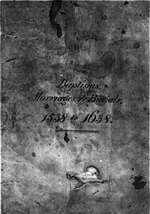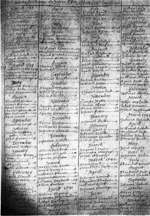
|
Parish Register - Thaxted, E.R.O. reference D/P 16/1/1 Registers of baptisms, marriages and burials begin in England with an Injunction arranged by Thomas Cromwell for Henry VIII on 5 September 1538. Every parson, vicar or curate was ordered to enter every wedding, christening and burial in his parish, with the names of the parties. The entries were to be made each Sunday after service in the presence of one of the church wardens. The mandate was enforced under a penalty of 3s. 4d. fo the repair of the church.20 Henceforth these important life events will be preserved. Jokingly, these are sometimes termed 'hatches, matches and despatches'. Keeping careful and accurate records is a sign that a society is becoming highly organised. The Romans for example counted heads as long ago as the reign of Emperor Augustus.21 Britain did not have census or headcounts until 1801, but parish records systematically kept like this are an important beginning.. At first loose papers were used or paper registers, but books of parchment were required after 1598. A secure coffer or chest was insisted upon. These parish chests were often iron-bound and with two locks and keys so that only the clergyman and his churchwardens could get at the registers, [see item L, below]. The reason given at the time for keeping parish registers was a concern for 'consanguinity'. A fear of too-close blood ties probably lay behind Henry VIII's own anxieties over marrying his brother's betrothed, Catherine of Aragon. Elsewhere, there were fears that claiming blood connections was too easy a route to divorce. It was felt to be high time that relationships were properly recorded. It was probably no accident that the careful writing down of baptisms occurred when there was a battle for the hearts and minds of Christians. Reformed churches struggled with the Catholic Church for adherents. Whatever the reasons, it is helpful to have such information recorded. Memory is frail and people do become confused over their beginnings. Nowadays the state has taken over and after September 1836 the General Register Office is responsible for the registration of births, marriages and deaths. Registers tell us about names. Name-calling is a powerful act. Names suffer from fashion, no less than many another human activity. In 1538-1539, Richard, Johannes,[John], Marioria [Marjoria]; Alicia; Beyt [Beth? for Elizabeth?]; Johanna [Joanna]; William; Agnes; Johannes; William, Margareta; Henricus; Alexander.; Alicia; Johannes etc...figured prominently. This particular register tells us on this page about burials. Baptisms on the other hand must be handled carefully as such dates do not tell us when the child was born. We choose in our own age to call St.George's Day, i.e. 23 April' the 'birthday of William Shakespeare'. Strictly speaking, we know only about his baptismal day. Parish registers are important to family historians no less than to other kinds of historian. Such increasing popularity threatens their continued existence. These days the researcher is often directed to the copy in place of the original.
|
||||||||
 |

